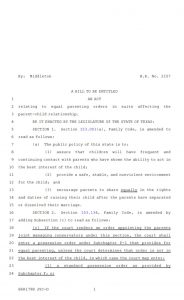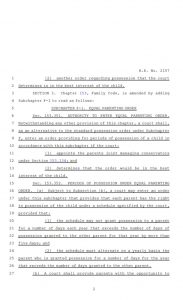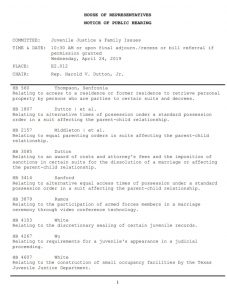Texas Legislators Feeling the Pressure Propose Equal Parental Rights Bills along with a Sanction Bill Aimed at Father’s Rights Groups
Texas has several bills related to equal parenting this year. Why so many? Texas Family Code is complex. These bills are intended to blend equal parenting into the Standard Possession Order (SPO) section of the current code, making it easier and more familiar for judges to order shared parenting.
What are the 50/50 bills being proposed?
One bill creates a default to equal parenting, if the judge finds that equal is in the best interest of the child.
Here is the text of the equal parenting bill, HB 2157, authorizing the judge to order equal possession time:



If equal possession time is ordered or elected, HB 3414 a complementary proposed bill proposes an actual alternative parenting plan under the standard possession order. This bill mandates that the parenting plan where “one parent is granted possession of the child for a greater number of days than the other parent in a year, the other parent must be granted possession of the child for that same number of days in the following year,” and requiring that this plan alternates so that the other parent gets the extra days the following year; equalizing the amount of time each parent spends with their children. HB 3414 is sponsored by Representative Sanford and creates a “Right to Alternative Equal Access Standard Possession Order.” Rep. Sanford’s bill satisfies the oppositions objection that a parent may not want equal parenting time, and addresses the fear about un-involved or absent parents getting equal parenting time. If the parent does not ask for the shared parenting, the court is not obligated to order it. Sanford seems to have put a lot of thought into how he proposes equal parenting.
What is the recent history of Texas equal parenting plan bills?
The equal parenting time bill presented by former Representative Pena in 2015 died in the calendar committee. Representative White presented an equal parenting bill that died before it ever received a hearing in 2017, with Rep. Dutton stating that violent threats were made causing a security concern so the bill was pulled. The equal parenting bill this 86th legislative session is not the same as the former proposed bills. HB 2157 sponsored by Representative Middleton is an evolved equal parenting bill and is scheduled to be heard on April 24, 2019 (the day before Parental Alienation Awareness Day – Bubbles of Love events are held internationally). Rep. Middleton is a newcomer and was just elected and sworn in January of this year. Rumor has it Middleton was passed this bill to sponsor since Rep. White who was being asked by many parental rights groups to sponsor equal parenting  bills is signed on to Rep. Dutton’s Alternative Beginning and Ending Standard Possession Order bill, also being heard this same day.
bills is signed on to Rep. Dutton’s Alternative Beginning and Ending Standard Possession Order bill, also being heard this same day.
This bill basically moves a few things around but is essentially the same as what is in the Texas Family Code (TFC) now. This bill was adopted after the first public hearing the JJFI committee held this year with invited speakers only, and the bar association’s Texas Family Law Foundation representatives testified that several bills were being presented to clean up parts of the TFC. These are the bills being heard this Wednesday at the Austin Capitol Building at 10:30 a. m.
Why is This Year Different?
There are many Texas parents who have been working towards this moment where they would have opportunity to testify again on an equal parenting time bill after several 50/50 bills died. Several states have passed shared parenting bills during this time period. There are also many states who claim to have equal parenting even though their statutes don’t actual say equal, but instead say “maximum” or “maximize” parenting time of each parent. Arizona for instance says that the parenting time between the parents is to be maximum and their appellate court recently confirmed that according to the way their statute is worded that theirs does indeed mean that the default is “equal.” That is not necessarily the case in all states. Take for instance, Texas, the current state law says that the public policy is to ensure that each parent has maximum time. But the judges do not order equal as a default. Instead Texas judges default to the current Standard Possession Order parenting plan which is 1st, 3rd, and 5th weekends and Thursdays. They default to what the 76th Texas legislature decided was the minimum time for a Joint Managing Conservator (JMC) who is fit and a “good enough” parent. Needless to say, Texas has not been one of the states to interpret maximum time as equal.
Thus, the parental rights movement in Texas has grown and many parents have come together and developed organized efforts for educating and pressuring the legislators to given them another chance to testify. Parents who have experienced the inconsistent, unpredictable, biased, and unjust family court practices hope that this will be the year for Texas to push an equal parenting time bill through to law. These parents are typically called noncustodial or nonresidential conservators, or labeled as the “loser parent.” These labels are creations of the the state, namely the state bar associations who lobby and influence the legislators to reject these bills.
In fact, TFLF has celebrated the defeat of prior equal parenting bills, stating that they have succeeded in shutting down bills that they claim would be bad for children. This is just another lie being told by the divorce industry to protect their revenue stream. Luckily for parents the bar association armor is starting to show cracks in it, where attorneys like Jeff Janssen in Iowa testifies that even though he knows that equal parenting would reduce his revenue stream, he is for it because that is what is best for children.
There is plenty of research, and decades of evidence, that shows that children of divorce who have equal access to each of their parents have much better behaviors in school, less anxiety, and less likely to become depressed or suicidal. Many also believe that there will be fewer school shooters with equal parenting, since most school shooters come from fatherless homes. As Fox News writer Suzanne Venker writes:
When boys don’t have this model, they suffer. And when they suffer, society suffers. A majority of school shooters come from fatherless homes; and a study of older male shooters (think Steven Paddock of the Las Vegas massacre) produces similar results. Indeed, the consequences of fatherlessness are simply staggering.
And the saddest part is most absent fathers aren’t absent by choice. The “deadbeat dad” exists, but not in spades. In many instances, women are divorcing perfectly good husbands in their search for what they believe will be a better match—which is a natural outgrowth of no-fault divorce. Certainly, women who are married to abusive or dangerous men must file for divorce. But such husbands and fathers cannot account for the 70 percent female-led divorce rate.
Divorce is destructive to both girls and boys. The research that was done on equal parenting was not gender specific, it shows that both boys and girls benefit, need, and have a right to the least restrictive access to both parents. Venker’s research reveals that “This is destructive to both boys and girls, but each sex suffers differently. Girls who grow up deprived of their father are more likely to become depressed, more likely to self-harm, and more likely to be promiscuous.”
Rep. Dutton Proposes Sanctions to Parents who use Federal Removal?
The line up of bills to be heard on this day include a bill that seems to be be strategically placed on the same day as the parental equality equal shared parenting bills. HB 3085 presented by the head of the Juvenile Justice & Family Issues Committee, Rep. Harold Dutton, to directly punish with sanctions any parent who files a federal removal. Interestingly however, the bill does not appear that it would apply to any of the parents in current litigation. The bill states that it applies to new Suits Affecting Parent-Child Relationships suits (SAPCR), and says nothing about applying to SAPCR modifications or child support hearings or modifications. Looks like this will be left up to the appellate courts (the judiciary) to interpret whether this will apply to those.
Where Do I Go to Testify on the Texas Equal Parenting Bill?
Attached is the link to the location of where you will need to go to testify in person in room e2.012: http://www.legis.state.tx.us/tlodocs/84R/schedules/html/C3402015041510301.htm
and here is where the live video feed of the testimony will be: http://www.house.state.tx.us/video-audio/
Want more information about testifying? Go to this page: https://www.mytxlegis.legis.state.tx.us/HWRSPublic/About.aspx
Where is the public hearing located for the Texas Equal Parenting Bill?
LOCATION: Texas State Capitol, Austin, House of Representatives
ROOM: E2.012
When is the hearing for the Texas Equal Parenting Bill?
TIME: 10:30 a.m.
DAY: Wednesday, April 24, 2019
What Committee is Hearing the Texas Equal Parenting Bill?
Juvenile Justice & Juvenile Issues Committee
Who is the Chair of the JJFI Committee?
Representative Harold V. Dutton, Jr.
Why should there be an equal parenting time statute?
The legislators need to clean up the mess that they created. Back in the early 90’s the 73rd legislators requested that the judges create a parenting plan template. The only county that did was Travis County in Austin. During the next legislative session, the 74th, legislators passed adopted this parenting plan as the Standard Possession Order and created Subchapter F. Section 153.312. This is the part that angers most parents and has caused the contentious adversarial battling. This is where it starts. The parent who wins the battle gets to restrict the other parent to this limited time schedule that the Family Law Foundation, or as Andrew McRae calls “the FLAW,” has tried without success to convince the parents and with limited success, to convince the legislators that the parenting plan is actually equal.
The legislators tried to appease the growing conflict between the parents and the state using its power to limit the parent that gets labeled the nonresidential conservator by passing the Alternative Expanded Possession Time, Sec. 153.317 where a parent can elect to have Thursday from the time school lets out until Friday morning, drop off at school. And on their 1st, 3rd, and 5th weekend, drop off on Monday morning at school instead of 6 p.m. Sunday evening surrender to the residential parent. This section became effective September 1, 2013 by the 83rd legislature. Most parents do not know about the expanded standard option and they only get it if they ask for it at the time that the just orders the parenting plan. Representative Dutton has a proposed bill to be heard on this day as well to make the Expanded parenting time provision more visible and obvious in the code, in hopes that more parents will realize it is there so they can elect it, and spend more time with their children.
The Attorney General website says that 90% of primary parents are mothers. This is more than the U.S. Census Bureau finds for the average throughout the U.S., which is about 84 percent. Regardless the reason for getting rid of the tender years doctrine was to eliminate gender bias. The Supreme Court also ruled that there can be no gender or marital based discrimination. This is legislated into the Texas Famiky code as well under Sec. 153.003.
The discrimination, coupled with the default parenting plan noncustodial parents feel like visitors in their child’s life, along with the statute saying they are to have maximum not minimum time has gone ignored, studies now support more time is healthier for the children, that there are negative effects on a child’s health, well being, bond, and future potentiality are negatively affected when the father is absent, and that more parents are learning these rights are fundamental and are supposed to be protected at strict scrutiny, have all stimulated father’s rights groups, parental alienation groups, and grandparent groups to rise up together, join causes and fight back. and where the father’s rights groups and talk about where even though a fit and loving parent, their time with their child is restricted to “weekends throughout the year beginning at 6 p.m. on the first, third, and fifth Friday of each month and ending at 6 p.m. on the following Sunday; and (2) on Thursdays of each week during the regular school term beginning at 6 p.m. and ending at 8 p.m.”
What should I bring with me?
Bring the Attorney General Opinion KP-0241 and remind the legislators that the AG now agrees that since these rights are fundamental the proper default is equal.
What Questions Might the Legislators Have?
Well for one the JJFI Committee might want to take out the requirement that the judge award equal if he awards joint managing conservatorship (JMC), unless he finds it is not in the best interest of the child. Some of them might balk at that and say they don’t want to make it a requirement. Most legislators have balked from anything that seems like a mandate. Nevermind that equal parenting is required by the supreme law of the land is the starting point.
It is very important to get equal parenting option into the code if for nothing else it satisfies the judges who have refused to order equal because they believe the family code does not allow it, favor it. This will eliminate the fear of being overturned on appeal and would resolve e some of that resistance.
What if I Cannot Make it to the Hearing?
You can submit your testimony in writing.
You can also e-mail the JJFI committee members with your testimony.
Click on any of the links below and it will take you directly to each of the house representative e-mails where you can write your testimony. Make sure you instruct them that you want this entered officially as testimony. If it is after the date of the public hearing, you can still have your voice heard by e-mailing your testimony to them and letting them know that you want it included in their consideration. If the bill was already voted on in the committee and made it through subcommittee, the bill has to be heard by the entire house floor before it can move to the Senate, and then the Governor. Therefore, it is still worth being heard because the bill will have to get to the full floor for a vote from the entire body of house lawmakers. It’s not too late, you can have an impact still and you can make a difference. That difference just might be saving the life of a child from the devastation of loss of one of their fit parents and all of the effects that comes along with that loss.
Rep. Harold V. Dutton Jr. — District 142
Rep. Andrew Murr — District 53
Rep. Rhetta Bowers — District 113
Rep. Gina Calanni — District 132
Rep. John P. Cyrier — District 17
Rep. Jay Dean — District 7
Rep. Ray Lopez — District 125
Rep. Hugh Shine — District 55
Rep. James Talarico — District 52
And you might also want to e-mail the sponsor of the bills you are interested in testifying on if they are not part of this committee:
Rep. Mayes Middleton — District 23
Who Represents Me?
Click here.
Does the Constitution Require Equal Parenting?
Attorneys and judges are known to say that the constitution does not require equal parenting. There is a stronger argument than research. Research fluctuates and courts are known for finding and appointing people to their courtrooms that support the outcome that the judge wants. So if the judge wants to deny equal parenting and say that it is not in the child’s best interest, the judge is going to find an expert that follows Judith Wallerstein’s research findings, and others who have credentials the judge can rely upon to support his personal beliefs and prejudices.
There is a stronger foundation that you can, but you will have to learn to use it. Using research will only get you so far. It might get you a presumption of equal, it might get you these so-called defaults that can be swept away at the whim of a sole government official, your judge, with the arbitrary and vague phrase, the best interest of the child. The Constitution does not directly say that equal is required. It says that . . .
Get a membership and read more about The Constitution and Equal Parenting. Get access to an Equal Parenting Treatise that you can attach to your testimony so that if the legislators are talked out of the research, choose to go with different research, they cannot argue their way out of the caselaw and the arguments that we make. Your rights are a super strong foundation. It takes strict scrutiny to pierce these rights and alter them, unless you don’t require it. It’s as simple as that, if you concede and fall for the bullying and pressure, then you lose the protection of these rights.
Recently, Attorney General Paxton released an opinion confirming that parental rights are protected by strict scrutiny, and that your parental rights are fundamental.



























